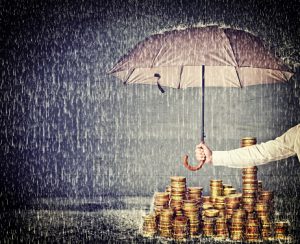Can I Take a Rain Check?


It’s likely that at some point you’ve had to ask someone for a rain check when it’s been more desirable to accept an offer at a later date rather than in the present moment. In a similar way, when you set aside money for a rainy day, you are serving your future self by being prepared for unexpected financial hurdles including layoffs, medical emergencies, unexpected home and car repairs, and more. These funds collectively make up your emergency fund. In this piece, we share our thoughts for determining an adequate emergency fund, creative ways to save, where to keep your emergency fund, when to utilize the funds, and how your relationship with money can change as a result of having an emergency fund.
How much should you have in your emergency fund?
As you may have heard us say before, the answer is “It depends!”. The “right” emergency fund is very specific to each individual’s situation and there are numerous factors to consider. First, the expenses to be considered include all essential living expenses like housing costs, debt payments, utilities, insurance premiums, and food costs. Other factors that may need to be considered include risk tolerance, savings ratio, and job security. The following questions can help begin determining the most appropriate emergency fund:
- How secure is your job?
- If you were to lose your job, when would you expect to find a similar position that is as good or better than your previous position?
- How many people depend on you for monetary support?
- Do you have a partner that could contribute more to expenses, if needed?
- Do you have additional means of financial aid (i.e. disability insurance)?
For some, the three-to-six months’ worth of expenses “rule of thumb” may work. But we think it is important to consider all factors when determining the most appropriate emergency fund for your specific situation.
What are some ways you can contribute to your emergency fund?
Saving for an emergency fund does not have to be completed over night – the idea of saving for three, six, eight, or even twelve months can be intimidating! Instead, start building your emergency fund slowly. One method that Yeske Buie utilizes in order to help Clients achieve their savings goals is by establishing savings policies. For example, we may suggest that you try setting aside a comfortable percentage of your income and bonuses to help you reach your emergency fund goal. Eventually, we find that many Clients experience a shift in mindset from feeling that saving is painful to feeling that saving is empowering.
Where should I keep my emergency fund?
Your emergency fund needs to be safe, readily available, and easily accessibly for when you need it most. Online savings accounts offering higher interest rates can be a great place to hold your emergency fund because they provide an opportunity for your funds to grow without sacrificing liquidity. It’s the best of both worlds! Take a look at Bankrate.com to view banks that offer competitive rates of return.
Another potential vehicle to hold your emergency fund is your Roth IRA. Roth IRAs permit withdrawals of the principal value (your contributions), tax-free and penalty-free, at any time. This is different than withdrawing earnings on investments, which can be subject to tax. Don’t pursue this strategy without making sure it’s right for your specific situation.
Finally, you could also choose to leave your designated emergency fund amount in cash. Then, once you have surpassed your emergency fund savings goal, you can begin investing the remaining deposits to take advantage of the opportunity for growth. This is a great way to establish your emergency fund and accomplish your planning goals at the same time.
When should I use my emergency fund?
Your emergency fund should only be used as a last resort in a true emergency. As was shared above, you want to use it only for serious circumstances that cause unexpected changes in income or expenses like a job loss, a medical procedure, or necessary home or automobile repairs. Furthermore, it is best practice to create policies that identify specific situations where you can or cannot take out money from your emergency fund before you actually need the funds. This will help you make a grounded decision in the moment and keep you from the temptation of using your emergency fund for a non-emergency. Another policy that can help you define your emergency fund spending is keeping the funds separate from your everyday checking account. This will help you take more time to reflect on when to spend your emergency fund savings.
In summary, an emergency fund is an essential component of a strong financial plan. We hope these tips provide you with some guidance on determining how to establish your emergency fund and encourage you to give yourself permission to take a rain check for your future self!
